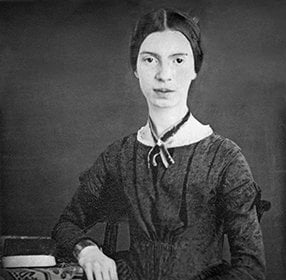One Year ago—jots what? (296)
One Year ago—jots what?
God—spell the word! I—can’t—
Was’t Grace? Not that—
Was’t Glory? That—will do—
Spell slower—Glory—
Such Anniversary shall be—
Sometimes—not often—in Eternity—
When farther Parted, than the Common Woe—
Look—feed upon each other’s faces—so—
In doubtful meal, if it be possible
Their Banquet’s true—
I tasted—careless—then—
I did not know the Wine
Came once a World—Did you?
Oh, had you told me so—
This Thirst would blister—easier—now—
You said it hurt you—most—
Mine—was an Acorn’s Breast—
And could not know how fondness grew
In Shaggier Vest—
Perhaps—I couldn’t—
But, had you looked in—
A Giant—eye to eye with you, had been—
No Acorn—then—
So—Twelve months ago—
We breathed—
Then dropped the Air—
Which bore it best?
Was this—the patientest—
Because it was a Child, you know—
And could not value—Air?
If to be “Elder”—mean most pain—
I’m old enough, today, I’m certain—then—
As old as thee—how soon?
One—Birthday more—or Ten?
Let me—choose!
Ah, Sir, None!
This poem is in the public domain. Published in Poem-a-Day on December 31, 2023, by the Academy of American Poets.
“One Year ago—jots what?” was first published in Bolts of Melody: New Poems of Emily Dickinson (Harper & Brothers, 1945). In The Art of Emily Dickinson’s Early Poetry (Harvard University Press, 2000), David T. Porter, professor emeritus of English at the University of Massachusetts, Amherst, writes, “In the poem ‘One Year ago—jots what?’ the speaker is trying to recapture (through the imagination) and to define an earlier time when parting from a lover was comparable to the pain of death. [. . .] In a manner similar to [John] Donne’s and [Robert] Browning’s (the abruptness of the rhythm, the use of colloquial language, the implication that a listener is present), Emily Dickinson establishes a vivid sense of presence and of personality. Faithful to the experience of hearing a person speak out of great emotion, the poet here implies that the emotional pressure defies any sort of auditory or rhythmical regularity. In the final stanza, true to the emotional intensity, the end-sounds shift nervously, repel, effect an exact rhyme once (then-Ten), and terminate in the sound None, for which there has been no precise auditory preparation, and for the meaning of which, indeed, there has been only a subtly indicative tendency in the speaker’s increasing insight into her condition [. . .].”

